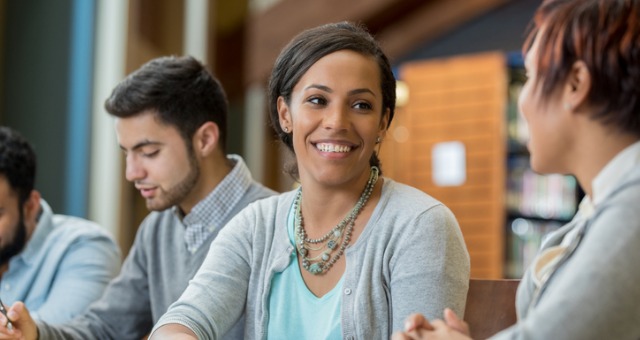We teach because we hope to inspire and prepare students for the future. We teach to invite transformation and enact lasting change. But how do we prepare students to step out of their comfort zones and have courageous conversations? How do we ask students to sit across the table from someone different from themselves and truly listen?
Critical pedagogy suggests that every human has the ability to look critically at the world through dialogical encounters with others (Freire, 1970). According to Freire, critical dialogue confirms our solidarity as human beings and actualizes the interconnection of our lives and thus our responsibility to and accountability for each other.
Today, as we watch our country fracture into polarized camps, we are faced with a dilemma of how to create real and meaningful opportunities for conversation and dialogue. In an effort to address this issue, three of us, Tasha Souza, Elizabeth Barnes, and Jenica Draney, teamed up to create an Intercultural Dialogue Partner project here at Boise State. The goal was for students to enhance their own understanding of, and skill in, intercultural communication through the process of interacting with an Intercultural Dialogue Partner (IDP) and analyzing those interactions based on course concepts. By partnering students in reciprocal and meaningful relationships, this project took a critical pedagogy and social justice orientation to address issues of power, privilege, and psychological well-being, not just cultural differences (Goodman, 2011).
The project paired 300-level students enrolled in Souza’s Intercultural Communication course with first-year students in two introductory English courses, both designed to develop English skills for multilingual students. These students were a mix of international and refugee students. The IDPs met for a series of five meetings throughout the semester. Students decided where and when they would meet. The pairs were expected to meet for 30-60 minutes, although many met for much longer. Both the native and the non-native speaking students came to these meetings with interview questions linked to course content. Students recorded their findings electronically after each meeting and then compiled these reflections into a final paper at the end of the semester. Our goal was for students to not only gain a deeper understanding of their partner’s and their own personal biographies, but also for students to consider contextual situations and structures that affect them similarly and differently (Nagda & Maxwell, 2011).
For Souza’s students, the experience highlighted the importance of authentic dialogue and cultural awareness. It made these concepts visible and experienced in a way readings cannot. One student stated in a final reflection, “It has shown me how fortunate some of us are.” Another communication student wrote, “We fought all discrimination toward each other and he was glad that I was able to understand him regardless of his accent and his African background.” A third student stated, “It has helped me see things from a new perspective. It has given me a greater appreciation for cultural differences in my life, and in the world.”
Another illuminating piece of this project was how many of the multilingual students stated that they had never had a native speaking student sit down and truly listen to them. While they may have interacted with native speakers in classes, the interactions were generally shallow. One student reported that this was the longest conversation he has had since coming to Idaho. Another international student wrote, “I realized how differences make us all human and make us the way we are today.” In some cases, the sharing of cultural differences led to the start of new friendships. IDPs cooked meals for one another, went hiking, watched movies, and shared Ramadan. A student received an invitation to their IDP’s engagement party and one pair took a long road trip together during a holiday break. In reflecting on their time together a student wrote, “both of us agreed that this experience was the most beneficial of the semester in any of our classes.”
Although the project was complicated by our current political climate, the learning that happened allowed space for consideration of codified experiences. The learning was real and lasting. True friendships were forged, and the way students viewed one another shifted. In a time where the loudest voices hold center stage, we asked our students to sit together, engage in dialogue, and find the space to share similarities and differences. It is rare to teach a class in which lives are changed and students’ fundamental understanding of another shifts. As one student wrote with raw honesty, “Now I notice skin color or accent a lot more after this experience. Just meaning that I notice these different people, and I don’t look through them like they are not there.”
References
Freire, P. (1970). Pedagogy of the oppressed. New York: Seabury.
Goodman, D. (2011). Promoting diversity and social justice: Educating people from privileged groups. New York: Routledge.
Nagda, B. R., & Maxwell, K. E. (2011). Deepening the layers of understanding and connection. A critical dialogic approach to facilitating intergroup dialogues. In K. E.Maxwell, & B. A. Nagda (Eds.), Facilitating intergroup dialogues: Bridging differences, catalyzing change (1-22). Sterling, Va.: Stylus Pub.
Dr. Tasha Souza is the associate director for the Center for Teaching and Learning and professor of communication at Boise State University. Previously, she was the faculty associate for inclusive excellence for Humboldt State University and a Fulbright scholar at the University of the West Indies in Barbados. She is a consultant on communication and pedagogy and has published in such areas as difficult dialogues in the classroom, addressing microaggressions with microresistance, instructional communication, and intercultural conflict.
Elizabeth Lester Barnes is a lecturer at Boise State University. She has an MFA in fiction and teaches creative writing with the Log Cabin Literary Center. From working with ravens on the North Slope of Alaska to working in a lockdown facility with youth, Elizabeth brings her lived experiences into her classroom. Her non-traditional journey into academia has drawn her into the fields of service learning, diversity, and accessibility.

